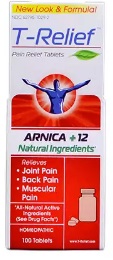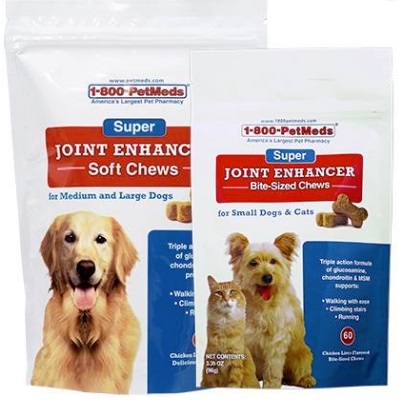Note: This post is sponsored by 1-800-PetMeds®. I was compensated for this post, but I only share information I feel is relevant to my readers.
Leave a comment below for a chance to win a bottle of Super Joint Enhancer for your dog.
Should you give a senior dog pain medication for things like sore joints?
This was a hard decision for me.
My older Lab mix Ace has had chronic pain in his back legs for about two years.
On top of that, the poor guy had to deal with a skin condition that was causing open wounds on his body. I am thankful we finally got that problem under control (blog post on that coming soon!) so now we are only dealing with joint issues.
Obviously I don’t want my dog to be in pain, but I’m also concerned about the potential side effects of pain medications (more on that below).
How do you find the right balance? Should you give your senior dog pain medication?

For me, it comes down to improving my senior dog’s quality of life. Yes, there are potential side effects to medications but this doesn’t mean every dog will have issues.
In our case, natural alternatives are not enough on their own to make my dog comfortable. That’s why his vet prescribed Rimadyl.
What is Rimadyl?
Ace’s vet prescribed a pain medication called Rimadyl to help with sore joints on a long-term basis.
We went with a less expensive generic version called Novox Carprofen, and we save more by ordering it through the online pet pharmacy 1-800-PetMeds® (prescription still required).
Rimadyl is a nonsteroidal, anti-inflammatory drug (NSAID) used to treat pain and inflammation in dogs due to:
- arthritis
- other joint diseases such as hip dysplasia
- surgery
- dental procedures
The medication works by reducing hormones that cause pain and inflammation in the dog’s body, according to 1-800-PetMeds®. This allows the dog to move and exercise with less pain. Read more about NSAIDs here.
It’s like if I were to take Advil, which is also a NSAID. Rimadyl is designed specifically for dogs and requires a prescription from a veterinarian.

With Ace, I originally gave him a dose on days where I knew he was going to be more active (and more likely to be sore later). For example, if we were going to the dog beach that day, I would give him his pain medication in the morning.
[quote_center]If we were going to the dog beach that day, I would give him his pain medication in the morning.[/quote_center]
Ace’s vet said it is OK to give the medication on an as-needed basis. It does not necessarily need to be given every day.
These days I do give Ace his pain medication every morning with breakfast. This seems to be the best choice for him at this time because it helps him enjoy his daily walks and playing with his tennis ball.
What are the potential side effects of Rimadyl?
One of the reasons I was hesitant to give Rimadyl to my dog was because of the risk of certain side effects, especially over the long term.
I ultimately decided it was worth the slight risk in order to make my dog’s life more enjoyable. According to PetMeds®, about 1 percent of dogs taking NSAIDs will experience some of the following:
Potential side effects of NSAIDs in dogs:
- digestive upset
- damage to the dog’s liver
- damage to the dog’s kidneys
- damage to the dog’s stomach
More info on NSAIDs’ side effects here (including Rimadyl’s).
To potentially decrease these side effects:
1. One option is to add an over-the-counter nutritional supplement to improve your dog’s liver function such as Denamarin, according to 1-800-PetMeds®. I have not tried this but it sounds like an option worth considering.
2. You can also consider occasional bloodwork to monitor your dog, especially if you plan to keep your pet on Rimadyl long term. Ace had bloodwork back in December and at that time there were no obvious problems.
3. Give the medication with food to decrease chances of an upset tummy.
Alternatives to prescription pain medications for dogs
 Because of the potential side effects of NSAIDs, you may want to consider some natural options first or work with your dog’s vet to find a balance between the two.
Because of the potential side effects of NSAIDs, you may want to consider some natural options first or work with your dog’s vet to find a balance between the two.
In Ace’s case, making sure to take him out for a couple of short walks each day seems to help keep his joints more limber and his muscles stronger. However, he does need to avoid running or chasing full speed after a tennis ball.
Some alternatives to pain medications include:
- T-Relief tablets (homeopathic product for pain relief)
- glucosamine/joint enhancer products
- fish oil
- acupuncture, chiropractic care or physical therapy
- the Assisi Loop
Benefits of glucosamine for dogs
 Giving your dog a glucosamine supplement might help reduce your dog’s joint pain because it has an anti-inflammatory effect. More info here.
Giving your dog a glucosamine supplement might help reduce your dog’s joint pain because it has an anti-inflammatory effect. More info here.
It can also:
- restore your dog’s joint health
- increase mobility
- lubricate the joints
- benefit dogs of all ages
Your dog’s vet can help you find the right balance between prescription pain medication and joint supplements for your dog. Sometimes with the right dose of glucosamine your dog may not even need pain medication.
For me, it comes down to weighing the pros and the cons of each product I give my dog, and improving his quality of life the best I can.
I’m thankful my dog is still able to enjoy visiting the local dog beach or strolling around our favorite parks. Senior dogs are so special and I appreciate the time I have with my boy.

Giveaway – Win a bottle of Super Joint Enhancer for your pet (3 winners)
PetMeds® is giving away a bottle of its Super Joint Enhancer to three readers of That Mutt.
 The winners will be able to choose from the tablet version (for dogs only) or the soft chew version (for dogs and cats).
The winners will be able to choose from the tablet version (for dogs only) or the soft chew version (for dogs and cats).
To enter:
Just leave a comment below to let me know which one of your pets could benefit from these products. I’ll choose three winners at random on Wed June 22. Must have a U.S. mailing address to win.
Could your dog benefit from a joint enhancer?
Let me know in the comments!
Note: If your dog is in need of urgent or emergency care, contact her veterinarian. This post is for informational and educational purposes and not intended to supplement or substitute your dog’s vet. It may be necessary to consult your dog’s veterinarian regarding your dog’s pain management, arthritis or any other medical condition.

Emilia
Thursday 28th of September 2017
Actually no matter if someone doesn't know then its up to other people that they will help, so here it happens.
Melissa Mellie
Monday 24th of October 2016
Thank you so much. For the treatment of senior pet's joint pain, you should concern your vet and also take homemade remedies, because these remedies are not harmful to your pet.
Lynn Enriquez
Friday 15th of July 2016
My poor old man, Dobby, got diagnosed with arthritis right after I was diagnosed with Rheumatoid arthritis! Some days both of us lay on bed together in pain. Sometimes when I am having a flare, I wimper to him like he does and he answers! We both understand the pain. Dogs are the best!
Lindsay Stordahl
Thursday 23rd of June 2016
Congrats to the three winners: Sandy W., Scott W. and Tanika C. I will be emailing you.
Fletch
Wednesday 22nd of June 2016
I love reading your blog because your situation is so similar to mine. There are a few small differences. My oldest son, (7 year old yellow lab) Kobalt, is your Ace. Whereas (2 year old Bloodhound) Ferguson is your Remy. Although, I do have a middle child (6 year old Mastiff/Cataoula) named Bamski who really puts his own stripes on the dynamic. On many occasions, I have been reading your blog and said to the kids, "Wow, can we relate to that or what?!" For example, although we wouldn't trade him for the world, we relate to your puppy remorse blog. Not to mention this topic really struck a cord with me because Kobalt has medication he takes every morning and night. Glucosamine and chondroitin for his joints and mobility. Phenobarbital for seizures. And the main reason I'm commenting, milk thistle as a herbal and safe remedy to the potential danger to his liver that long term use of remdyl may cause. Only your vet can tell you whats right for Ace, but during his biannual liver profile and blood work we noticed a rapid decline in kobalts liver function and an Army veteran friend with Hepatitis told me about the milk thistle. Not only did it stop Kobalts liver from further deteriorating but it actually reversed and now helps REGENERATE his liver! As I am few days behind on my email, Im probably too late for the drawing, but still wanted to suggest a little homeopathic help for Ace, just in case. Keep up the good work hon! We love what you're doing! A plethora of thanks for the wisdom and love you put in, Fletch Kobalt Bamski Ferguson Randy (my husband lol)
Lindsay Stordahl
Thursday 23rd of June 2016
Thanks so much Fletch!